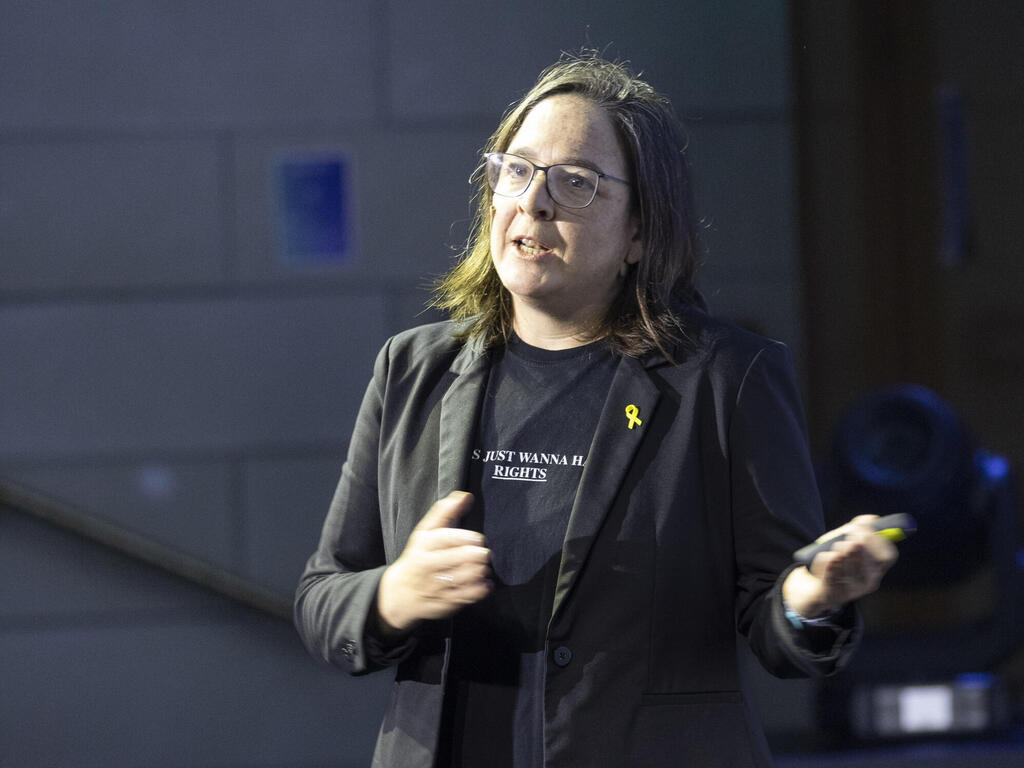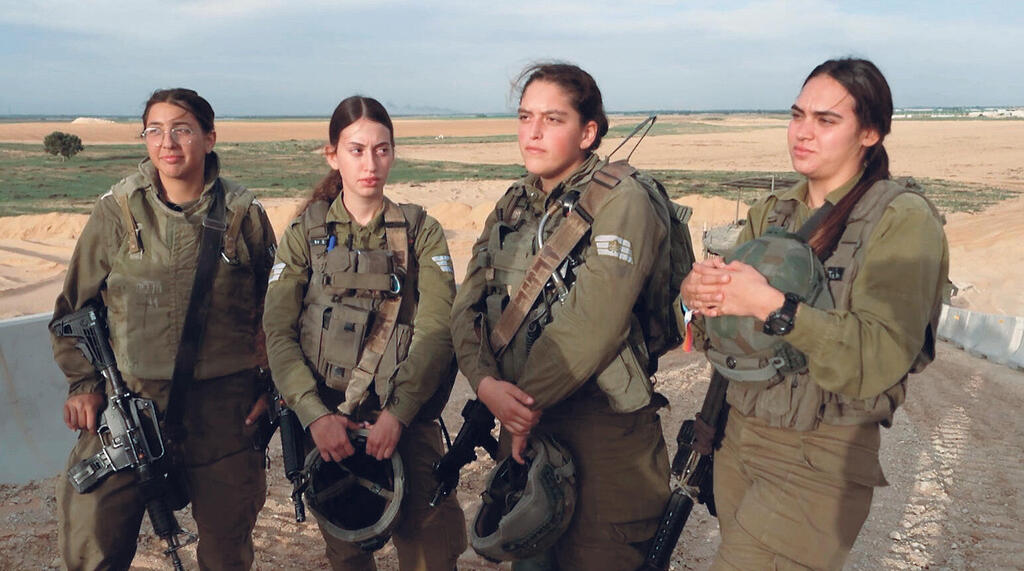
FemTech
There were many basic assumptions about women in the military. They didn’t hold after October 7
Ora Peled Nakash, founder, entrepreneur, and a retired naval officer and the first woman to graduate from the unified program at the Israeli Naval Academy, spoke to CTech about the need for the integration of women in military submarine units, and how October 7th has proven beyond a doubt the mettle and ability of female soldiers
“Before the war, there was this basic assumption leading the entire process of stationing [women] in certain areas and assigning them certain tasks. It didn’t hold because when war came they did what they needed to do and fought terrorists,” says Ora Peled Nakash, a retired naval officer, speaking at FemTech IL’s annual conference. “This assumption that because they’re girls they shouldn’t be engaged in certain types of military activity was complete nonsense. This war presents us with an opportunity to let go of these limiting assumptions.”
Peled Nakash has built a career working in software development, as an expert in user experience, including a decade at IBM. She most recently founded and serves as the CEO of agritech startup CoverDolly. She was also the first woman to graduate from the unified program at the Israeli Naval Academy. “There was a good decade where I didn’t include my military background on my CV. I was the first woman, and it shouldn’t have mattered, but it does. I’m old enough now to understand that visibility is crucial.”
Peled Nakash grew up near a major air force base in the north of the country and dreamt of becoming a pilot. “Technically it wasn’t even possible at the time because the flight academy wasn’t open to women.” This changed in 1995 when pilot Alice Miller successfully sued the government for discrimination when she was prevented from entering the Israeli Air Force Flight Academy. The case went to the Supreme Court who ruled that it was unconstitutional to bar women from combat roles, which effectively opened combat roles for women in the military.
This allowed Peled Nakash, who entered the army in 1998, to enlist in the navy. She was part of the first cohort to include women and the first and only woman to graduate from her class in August 2000. She proceeded to serve on a missile boat - the only track open to women at the time - and served as navigational tactical officer on a surface ship for six years. Although released from reserves years ago, she still volunteers as a reservist, and since October 7th.
While there has certainly been progress in terms of women’s integration in the military, Peled Nakash says that it isn’t sufficient. “This is Kayla Barron, she was a pioneering American submarine officer and today she is an astronaut at NASA training to be the first woman to set foot on the moon,” says Peled Nakash, pointing to an image of Barron during her presentation at the FemTech IL conference. “I salute Kayla, but I'm also a little worried because at this rate a woman will set foot on the moon before an Israeli submarine.”
Although Peled Nakash herself didn't herself serve on a submarine (which was and remains closed to women), she has been a part of several studies and initiatives led by veterans of the navy who have been researching and advocating for integration in submarines. “Submarines are an extreme scenario: it's a single vessel which is among the most expensive, difficult to operate and requires the most skilled and best trained crew. It’s completely isolated by nature, and represents going the full way [for gender integration] as a society or as a military,” says Peled Nakash. “It’s a good standard unit you can use to compare gender integration across navies throughout the world.”
She acknowledges that there are some structural reasons that make progress in this domain even slower than other parts of the military. “Things might be slower in the navy than other units because of structural changes required for the vessels, which are built in shipyards and involve processes which take decades. The design and engineering of submarines that are currently being built began a decade ago. Submarines that are currently being designed to accommodate men and women on board won’t be ready until 2030.”
However, Peled Nakash says that cultural biases more than design limitations have prevented integration on submarines. While female representation in the IDF has improved over time, it has long been a point of contention for the religious-right who have argued for gender segregation within the army and to reduce female participation in general. Common arguments that she hears include that mixed units will be less cohesive, that the presence of women in such units will reduce the motivation for men to serve, and suggestions of starting small pilot programs instead of fully integrating women.
3 View gallery


Peled Nakash speaking at the FemTech IL conference.
(Credit: Snap! The Social Center for Photography)
And, while other democratic states have managed to overcome “structural” challenges posed by submarines, Israel lags far behind. Women have served in submarines in the U.S. Navy since 2012, the number of women in non-nuclear submarines having doubled from 80 in 2019 to 160 in 2023, according to Naval Submarine Forces officials. Women have been serving in submarines in the Canadian navy since 2001. South Korea is currently training its first cohort of women to begin serving in submarines this year.
The impact of October 7th
Among the many illusions and assumptions that were shattered on October 7th, was the notion that women were not capable of serving in combat roles at the highest level. The heroism and active role played by female combat soldiers on October 7th and the ongoing war on both the Gaza and Lebanon borders, has been much called a watershed moment for women’s equality. For a country whose military is so linked to the echelons of political and economic power, the impact is vast.
“The war has highlighted how all of these cultural biases are in people’s heads rather than reality. There were many limiting beliefs about what women should be doing at war. For example, women serving in tank units were expected to passively guard the borders and not take an active role in fighting or to go on the offense. We witnessed that [the female tank units] did an incredible job saving lives when they were required to,” says Peled Nakash.
Women soldiers in both mixed and all-female units were directly involved in several battles against invading Hamas terrorists on October 7th and in the subsequent war. One of the most well-known battles involved an all-female Caracal tank unit which fought for hours against Hamas terrorists. They successfully defended the neighboring kibbutzim from infiltration, and killed an estimated 100 terrorists without losing a single member of their unit.
There has been a massive surge in enlistment by women in combat units since the outbreak of the war. In a society where military service is foundational to national identity, where networks formed in the army lead directly to professional opportunities, equality is essential. A disproportionate number of high-tech leaders and entrepreneurs are graduates of the IDF’s vaunted intelligence units, where the training they receive and networks they build are crucial to establishing careers in Israel’s tech industry. Likewise, military credentials are considered a requirement for political leadership, and low numbers of women in elite units and leadership roles is often cited as one of the many reasons for poor female representation at the highest levels of Israel’s government.
“In Israeli society, military service is our college system in a way. Certain military units are our equivalent of the Ivy Leagues. By denying women access to some of our finest units - the most prestigious parts of the melting pot - we’re forging a society where women are second class citizens. If we want to see women serve as civil leaders we must allow them access to the highest quality military service,” says Peled Nakash.
Serving in elite units also provides women, in particular, with invaluable skills, says Peled Nakash. “I think that serving a demanding role as a woman in the military builds self-esteem, skills, resilience and discipline that nobody can take away from you.”
“This war has provided evidence proving the competence of women and our ability to contribute in a significant way,” says Peled Nakash. “Amid these terrible and dark days, what didn’t need to be proven has been proven, and proven the hard way, and I salute the brave women who did their part.”















